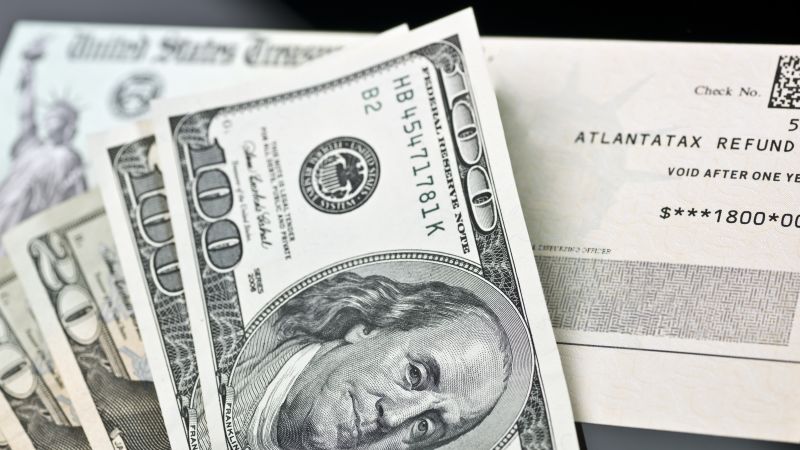
CNN Underscored reviews financial products based on their overall value. We may receive a commission through our affiliate partners if you apply and are approved for a product, but our reporting is always independent and objective.
As of March 24, the Internal Revenue Service (IRS) had issued more than 59 million tax refunds with an average refund amount of $2,903. That’s down about 11% from last year’s average tax refund of $3,263, but it’s still a big enough amount for most taxpayers to find a productive use.
A refund in this range used wisely could be enough to jump-start a savings plan or help someone save thousands of dollars in interest payments on debt, but that’s only if the money is used wisely before it gets frittered away or spent on groceries and regular bills.
If you’re looking for a way to use your tax refund for maximum impact, here are some of the best options to consider in 2023 and beyond.

With interest rates rising throughout 2022 and into 2023, credit card debt and other variable debts are now more costly than they have been the last few years. For example, recent stats from the Fed showed the average credit card interest rate on accounts it assessed worked out to 20.40% at last count, compared to 16.45% throughout 2021 and 16.28% in 2020.
If you have credit card debt at rates in this range or anywhere close, using your tax refund to pay it down or completely off can leave you with fewer bills and lower interest charges. For example, a $3,000 credit card balance at 20.40% with a minimum monthly payment of $60 would require payments for 113 months with $3,752 in interest charges tacked on along the way.
Beyond credit cards, you may want to make progress on high-interest auto loans, personal loans or any other outstanding debt with a high interest rate. Doing this could put you in a better place financially, and your future self will thank you.
If you can’t pay down all of your credit card debt at once, you can use your tax refund to cover a portion of it. Then, you might consider opening a balance transfer credit card to refinance the rest at a promotional 0% interest rate. Cards like the Citi® Diamond Preferred® Card offer an introductory 0% APR for 21 months (17.74% to 28.49% variable APR afterward) on balance transfers.

While rising interest rates can make carrying debt costly, they can also help you beef up your savings. The fact is, a range of high-yield savings accounts and certificates of deposit (CDs) are offering some pretty good rates right now with no fees attached.
As an example, you can get a 10-month CD right now through Marcus by Goldman Sachs with a 5.05% APY as long as you have at least $500 to stash away. Further, many of the best high-yield savings accounts are offering high interest rates too, like the CIT Bank Savings Connect account, which currently offers a 4.5% APY on deposits.

Maybe you’re happy with your debt levels and short-term savings but you want to get ahead for retirement. You can always increase the percentage you’re contributing to a workplace retirement account or contribute to a traditional or Roth IRA if you meet eligibility requirements.
In 2023, most people can contribute up to $6,500 across all IRA accounts. The exception is for people ages 50 and older, who can contribute an extra $1,000 for a maximum of $7,500 this year.
Just remember that income limits cap who can contribute to a Roth IRA directly, so you may be prevented from doing so if you are married filing jointly with an income over $214,000. You may also be stuck contributing a reduced amount if you are married filing jointly with an income from $204,000 to less than $214,000. Other income caps and phase-out periods apply to single filers, heads of household and qualifying widowers.
And while anyone with earned income can contribute to a traditional IRA, contributions are only tax-deductible for people who meet certain criteria and/or income requirements.

With Biden’s student loan forgiveness plan still up in the air, it never hurts to start saving for college now if you have the means.
Many states offer tax advantages for contributing to a 529 college savings plan, and it’s possible to invest the money in underlying funds so it can grow and compound over time. As an example of tax advantages, the state of Indiana offers a 20% tax credit on the first $7,500 you contribute to a 529 plan in 2023.
If you’re worried about overfunding for college, you should know that the Secure Act 2.0 has some built-in relief here starting in 2024. Specifically, people with a 529 plan open for at least 15 years will be able to move up to $35,000 in unused 529 college savings plan funds to a Roth IRA for the beneficiary (subject to annual contribution limits).

Buying life insurance is something that’s easy to put off, but it can easily cost you less than what you would pay for a dinner out each month. With your tax refund money safely in your account, it definitely makes sense to price out coverage for yourself and a spouse “just in case.”
As an example, a company called Bestow lets you purchase inexpensive term coverage to protect your family with the potential for no medical exams required. Coverage is available in amounts from $100,000 to $1.5 million, and you can apply if you’re ages 18 to 60. Best of all, term life insurance rates from Bestow start at just $11 per month.
Shop for term life insurance and get offers from multiple insurers at once with Money.com.

Investing in yourself can look different depending on your goals, and you can choose to focus on your professional life or something else entirely. For example, the average tax refund could be enough for a few years of gym membership or even a home gym so you can finally get in tip-top shape. You could even invest in a new wardrobe or the dental work you’ve been putting off for a few years.
On the professional side of things, you could spend the cash on membership in a mastermind group, a certificate program or another kind of formal education. The average cost of one year of community college is not likely much more than the average tax refund at $3,860 for in-district tuition for the 2022 to 2023 school year, so that’s an option too.
While your tax refund is really just your money that you overpaid to the government, there’s nothing wrong with setting some of it aside for something you really want. Maybe it’s that vacation you’ve desperately needed the last few years, or perhaps a new mattress, home decor or a new laptop for the kids.
Ideally, you can spend some of your tax refund on something that helps you get ahead while also reserving some cash for a purchase or experience that makes you happy. “Everything in moderation,” as they say, and there’s more to life than taxes and bills anyway.
Get all the latest personal finance deals, news and advice at CNN Underscored Money.
